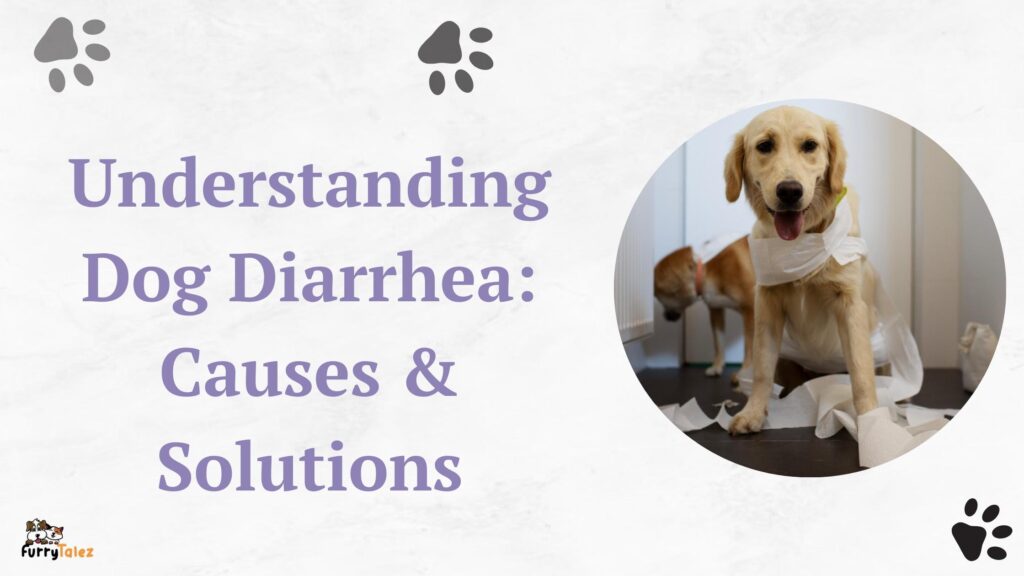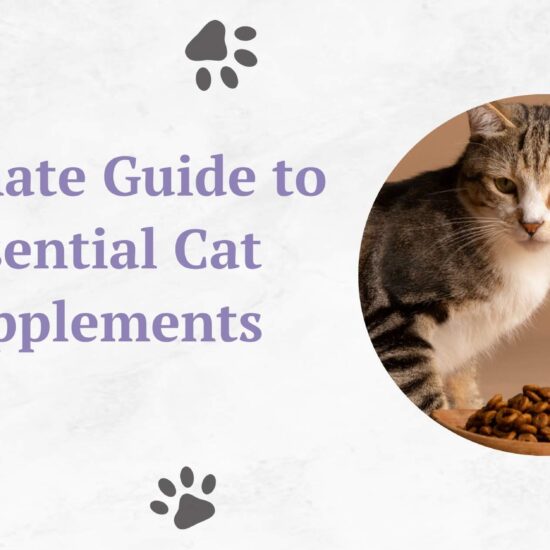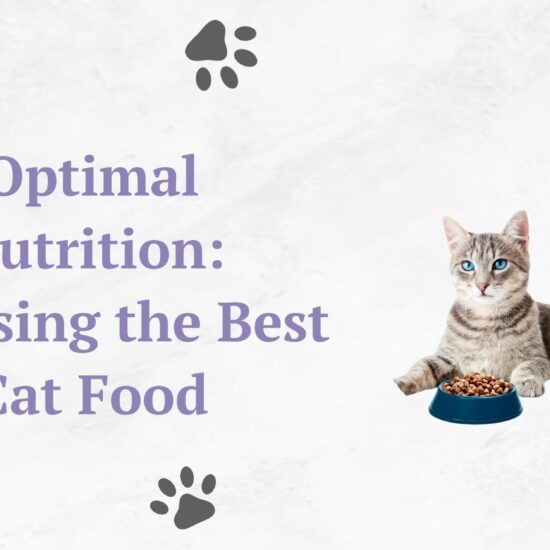Did you know that over 90% of dogs will get diarrhea at some point? This common problem can be caused by many things. It might be from eating new foods, table scraps, or just trying new tastes.
But, dog diarrhea is more than just a hassle. It can also warn you about serious health problems. These issues might affect your dog’s well-being.
In this article, we’ll look at why dogs get diarrhea. We’ll cover everything from eating too much to serious health issues. Knowing the reasons will help you treat your dog’s diarrhea better. This way, your furry friend can stay happy and healthy.
Table of Contents
The Basics of Dog Diarrhea
Diarrhea in dogs means they have loose or watery stools more often than usual. It can come from many causes, from mild stomach upset to serious health problems. Mild cases often happen when dogs eat things they shouldn’t, like table scraps.
If diarrhea keeps coming back, it might mean there’s a bigger problem. This could be something serious with their digestive system.
Knowing the difference between sudden and long-lasting diarrhea is key. Sudden diarrhea usually goes away fast. But diarrhea that lasts for weeks can be a sign of bigger health issues. Dogs with diarrhea often have problems like eating things they shouldn’t, stress, or even infections like parvovirus.
Signs like blood in the stool, vomiting, weakness, and dehydration need a vet right away. Giving human medicine to dogs without a vet’s okay can be harmful. It’s important to know when to get help to treat your dog properly.
Watching how often and what your dog’s stool looks like is important. It can tell you a lot about their health. Spotting changes early can help manage and treat their digestive issues better.
Common Causes of Diarrhea in Dogs
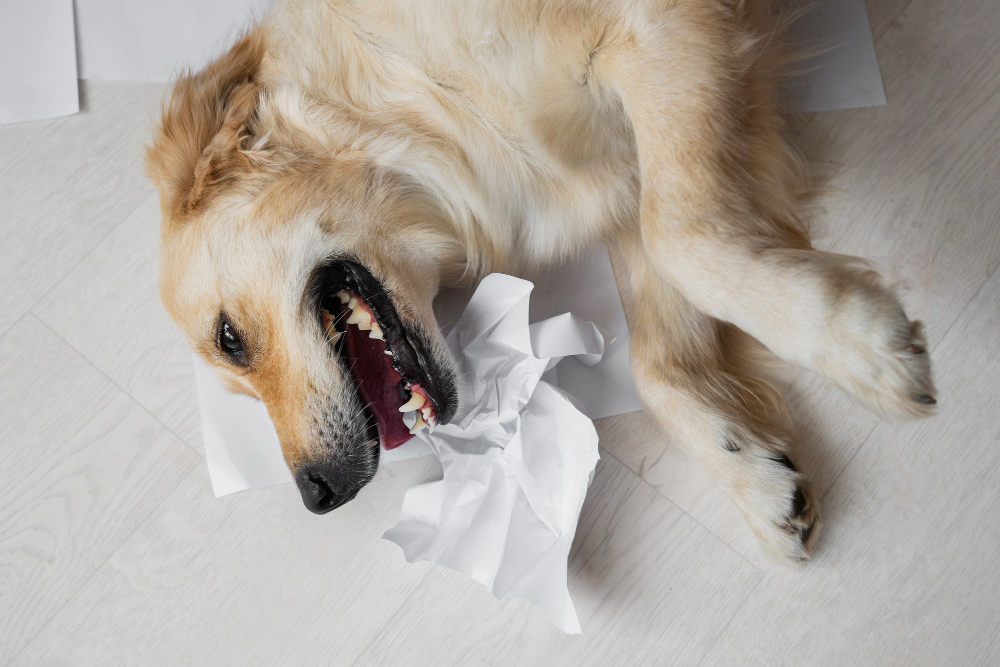
Dog diarrhea can come from many sources, like their environment and food. Eating things they shouldn’t, like table scraps, can upset their stomach. This often leads to mild diarrhea.
More serious issues can cause severe diarrhea. These include eating toxic substances, viral infections like parvovirus, and bacterial infections like salmonella. It’s important to know these causes to act quickly.
Stress and anxiety can also cause diarrhea in dogs. Changes in their environment or routine can upset them. Intestinal infections, whether bacterial, viral, or parasitic, are a big risk, especially for puppies and dogs with weak immune systems.
Changing a dog’s diet too quickly can upset their stomach. This can lead to diarrhea. It’s best to slowly introduce new foods to keep their digestive system healthy.
Watching your dog’s health closely is key. If they have diarrhea often, it might be a sign of a bigger problem. Issues like colitis or intestinal parasites can cause chronic diarrhea and need vet care.
In short, knowing the common causes of dog diarrhea and acting fast can help keep your dog healthy.
Dog Diarrhea: When to Worry
Knowing when dog diarrhea is serious is key for pet owners. Mild cases can be handled at home. But, some signs mean you should see a vet. If your dog has diarrhea for over 48 hours, get help.
Make sure your dog always has fresh water. This is important to avoid dehydration.
Look out for signs of a dog upset stomach. These include being very tired and not wanting to eat. If your dog has diarrhea and these symptoms, it could be a bigger problem.
Black or tarry stools are a big warning sign. They can mean infections, ulcers, or even trauma.
Stress can also cause dog diarrhea. Things like vet visits or big changes can upset their stomach. Knowing what stresses your dog can help prevent problems.
- Seek veterinary attention if your dog’s diarrhea is accompanied by:
- Vomiting
- Dry gums or excessive drooling
- Persistent lack of appetite
- Blood in the stool
Knowing what causes dog diarrhea helps you know when to get help. A vet visit can start the right treatment. This can prevent serious health problems.
Identifying Symptoms Associated with Diarrhea in Dogs
Seeing dog diarrhea symptoms is more than just noticing loose stools. Other signs can show deeper digestive problems. It’s crucial for pet owners to watch for any unusual behavior or changes in their dogs. Common symptoms include:
- Vomiting: Frequent vomiting may accompany diarrhea, signaling an upset stomach.
- Lack of appetite: Dogs may show little interest in food during these episodes.
- Blood in the stool: This can be a serious warning sign requiring immediate veterinary attention.
- Dehydration: Symptoms like lethargy and dry gums suggest hydration issues and are common with diarrhea.
Not just any changes are significant; the consistency, volume, and color of the stool can all signal signs of dog digestive issues. For instance, a perfect stool is chocolate brown with a firm, log-like shape. Abnormalities such as watery consistency, large volumes, or the presence of mucus may indicate underlying gastrointestinal problems.
Changes in color can also provide vital clues. Yellow stool can signal liver issues, while black and tarry stool necessitates prompt veterinary intervention. Pet owners should monitor their dogs and be prepared to share their observations with a veterinarian for accurate diagnostics and effective treatment planning.
Dog Diarrhea: Diagnosis by Your Veterinarian

Diagnosing dog diarrhea is a detailed process. It starts with looking at the dog’s health history and symptoms. A vet will also do a physical check-up. Getting stool samples is key to check for different issues.
Tests like blood counts, liver and kidney checks, and urine tests are often used. These help find out what’s causing the diarrhea.
Changes in blood counts can show problems like infections or allergies. Liver or kidney damage can be found through blood tests. Urine tests help check kidney health and dehydration levels.
If diarrhea lasts or comes with other symptoms, more tests might be needed. These could include:
| Diagnostic Test | Purpose |
|---|---|
| Fecal culture | Identifies bacterial pathogens |
| Fecal antigen testing | Detects specific infections |
| Radiographs | Visual assessment of internal organs |
| Endoscopy | Direct visualization of the digestive tract |
| Serum thyroxine testing (total T4) | Diagnoses hyperthyroidism in cats |
Getting a proper diagnosis helps find the right treatment. Early detection is key for serious infections. Following your vet’s advice can help your dog get better faster.
How to Treat Dog Diarrhea at Home
For mild cases, treating dog diarrhea at home can be effective. There are several strategies to manage it, helping your dog feel better. Knowing the right approach is key when using home remedies for dog diarrhea.
Fasting as a Treatment Method
Fasting for 12 to 24 hours lets your dog’s digestive system rest. This break from food can lessen irritation and aid in healing. It’s important to watch your dog closely to make sure they stay hydrated.
Implementing a Bland Diet
After fasting, start with a bland diet. Choose simple, soft foods like:
- Plain-cooked white rice
- Boiled chicken (without skin)
- Pumpkin puree
- Cottage cheese
These foods are easy on the stomach and can calm digestive issues. It’s important to avoid rich or fatty foods to prevent more irritation.
Role of Probiotics and Supplements
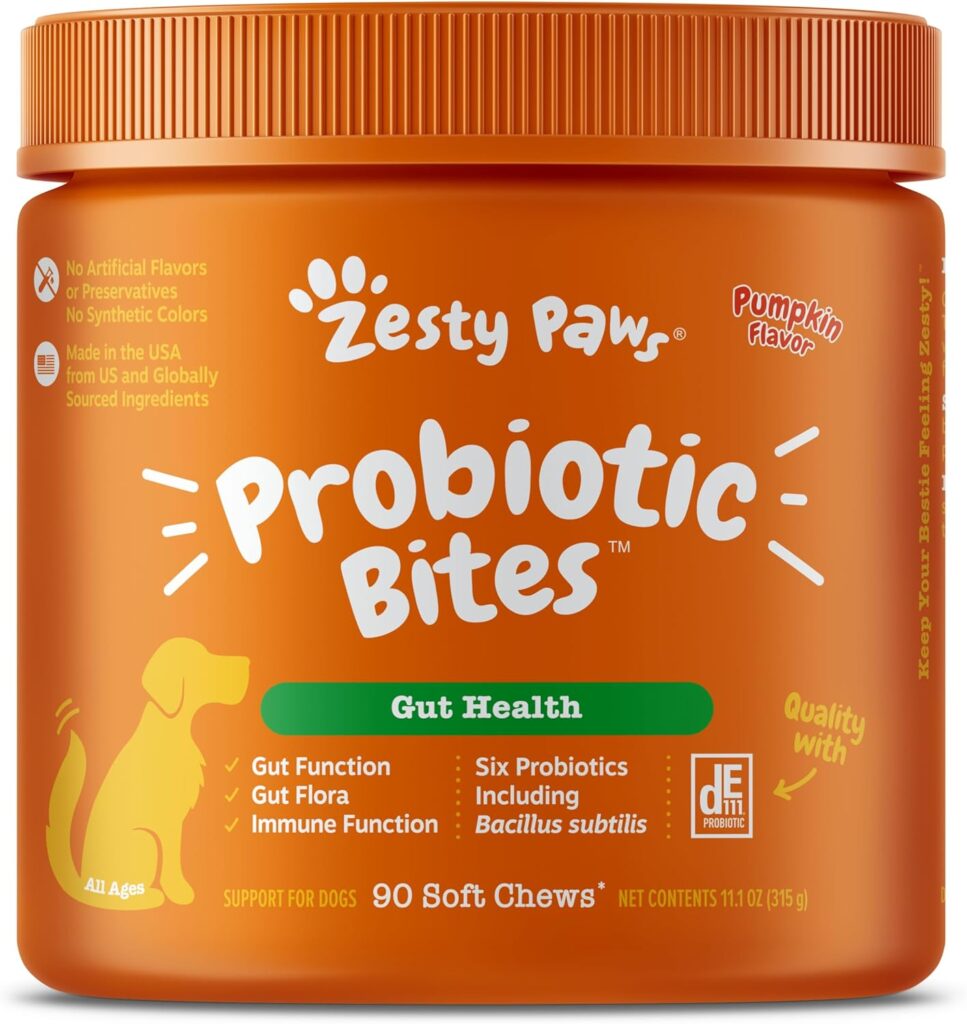
Adding probiotics to your dog’s diet can help balance their gut. Products with S. boulardii and B. subtilis support gut health, helping with digestion. Natural yogurt is also a good source of beneficial bacteria, boosting overall health.
Always talk to a vet before trying home remedies for dog diarrhea, especially if symptoms don’t go away. Taking proactive steps ensures your dog stays healthy during their recovery.
Veterinary Treatment Options for Dog Diarrhea
If home remedies don’t work for dog diarrhea, it’s time to see a vet. Diarrhea can lead to dehydration, loss of important minerals, and trouble absorbing nutrients. Quick vet care is key to avoid serious health problems, especially in puppies, older dogs, and those with health issues.
Vets will run tests to find out why your dog has diarrhea. They might do:
- Fecal checks
- Infectious disease testing
- Bloodwork
- X-rays
- Ultrasounds
The vet will create a treatment plan for your dog’s diarrhea. It might include:
- Electrolyte-balanced fluids to treat dehydration
- Medicines to stop diarrhea and calm the stomach
- Special diets to help the stomach heal
- Probiotics to improve gut health
A study found that almost half of dogs with sudden diarrhea get antibiotics. Vets also suggest medicines for the stomach and probiotics. This shows how important it is to tailor treatment to each dog’s needs.
| Treatment Option | Description |
|---|---|
| Medications | Anti-diarrheal agents and antibiotics for infections |
| Fluids | IV fluids for severe dehydration |
| Special Diets | Bland or prescription feeds for gastrointestinal support |
| Probiotics | Supplements to enhance digestive health |
It’s important to watch your dog closely. If their symptoms don’t get better or get worse, take them to the vet right away. This can help keep your dog safe from diarrhea’s dangers.
Preventing Diarrhea in Dogs
Keeping your dog’s digestive system healthy is key. Simple steps can help prevent diarrhea and keep your dog’s digestive system working well.
- Maintain a Consistent Diet: A steady diet with good dog food helps avoid stomach problems.
- Avoid Table Scraps: Human food can upset your dog’s stomach. Avoiding it helps keep their digestive system healthy.
- Monitor Stress Levels: Stress can cause diarrhea in dogs. Keeping them calm and avoiding big changes helps their digestive health.
- Regular Veterinary Check-ups: Regular vet visits can catch health issues early. This helps prevent diarrhea.
- Be Cautious with Treats: Make sure treats are safe and won’t upset your dog’s stomach.
- Secure the Environment: Keep harmful or spoiled food away. This stops your dog from eating things that could harm them.
By taking these steps, you can help prevent diarrhea in your dog. Keeping their environment safe and their diet balanced greatly improves their digestive health.
| Preventive Measure | Benefits |
|---|---|
| Stable Diet | Reduces gastrointestinal distress and promotes regularity. |
| Avoiding Scraps | Prevents exposure to foods that may upset the stomach. |
| Stress Management | Decreases likelihood of diarrhea linked to anxiety. |
| Regular Vet Check-ups | Facilitates early detection of health issues. |
| Environment Security | Avoids ingestion of harmful foods or objects. |
Understanding Canine Digestive Health
Keeping your dog’s digestive health in top shape is all about nutrition. A balanced diet is key, affecting their energy and digestion. Talking to your vet helps pick the right food for your dog’s unique needs.
The Importance of a Balanced Diet
A balanced diet helps your dog digest better and avoids stomach troubles. It should include:
- High-quality proteins: Supports muscle and tissue health.
- Healthy fats: Essential for energy and absorption of fat-soluble vitamins.
- Fiber: Promotes healthy bowel movements and aids in controlling diarrhea.
- Vitamins and minerals: Critical for overall health and digestion.
Regular Veterinary Check-ups
Regular vet visits are crucial for your dog’s digestive health. They catch problems early and adjust diets or treatments as needed. Vets can also suggest diets that boost your dog’s digestive health.
| Diet Component | Function | Sources |
|---|---|---|
| Proteins | Tissue repair and growth | Meat, fish, eggs |
| Fats | Energy source and nutrient absorption | Fish oil, chicken fat |
| Fiber | Digestive health and bowel regulation | Vegetables, grains |
| Vitamins & Minerals | Supports various bodily functions | Supplemental foods, fortified kibble |
The Role of Stress in Dog Diarrhea

Stress can cause dog diarrhea, especially during big changes. Things like car rides, vet visits, or boarding can upset a dog’s stomach. It’s important for dog owners to understand this link to manage their pet’s anxiety.
When a dog feels stressed, its body releases norepinephrine. This can lead to diarrhea. Some dogs might also get carsick and vomit. Giving them anti-nausea or anti-anxiety meds before stressful times can help prevent diarrhea.
To make car rides better for your dog, try using Adaptil or Feliway. Spraying a bandana with these can calm them down. Also, let them get used to their carrier at home before trips.
Changing your dog’s diet can also help with stress colitis. Skipping a meal before traveling and adding fiber can make their stool firmer. Most dogs get better in 2-5 days with plenty of water and the right food. Watch them closely in the first 48-72 hours.
If your dog doesn’t want to eat, seems tired, or has bloody stool, see a vet right away. Knowing these signs is key to preventing or treating dog diarrhea caused by stress.
| Stress Triggers | Effects | Management Strategies |
|---|---|---|
| Car rides | Carsickness, vomiting, diarrhea | Administer anti-nausea medication, use calming sprays |
| Veterinary visits | Stress colitis, digestive upset | Exposure to the carrier, positive reinforcement |
| Boarding or daycare | Diarrhea, anxiety-related symptoms | Provide familiar toys, calming products |
| Changes in routine | Stress colitis potential | Diet adjustments, fiber supplements |
Using Dog Diapers for Management
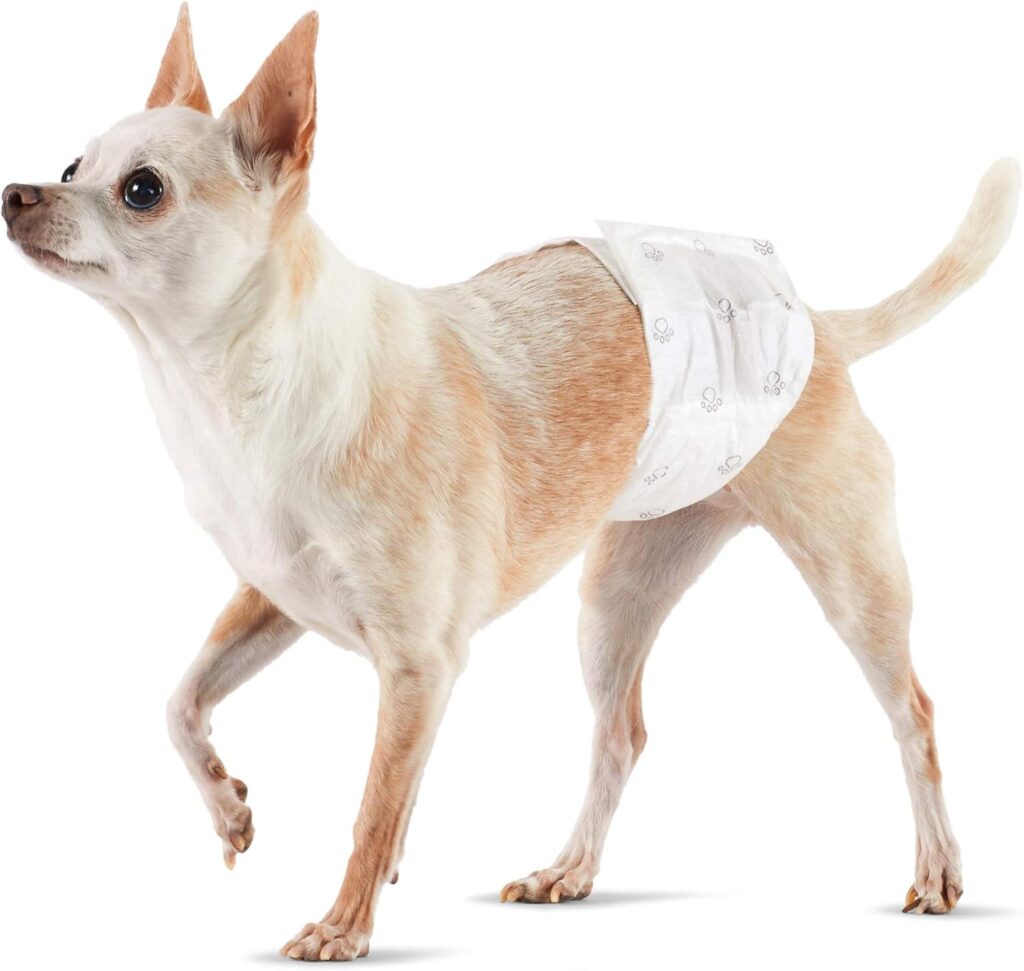
Dog diapers are a helpful tool in pet care, especially for managing diarrhea. They are great for dogs recovering or for older dogs with mobility issues. These diapers keep your home clean and make handling accidents easier.
Choosing the right size and type of diaper is key. You can pick from disposable or reusable diapers. Disposable ones are easy to use on the go, but reusable ones are better for the planet. If you’re on a budget, consider second-hand cloth diapers for a cost-effective option.
Always watch your dog when they’re wearing diapers to avoid any harm. It’s important to change them often to keep your dog clean and prevent infections. With these tips, you can use dog diapers to manage your dog’s diarrhea and reduce stress.
Disclaimer: The information provided in this article is for educational purposes only and should not be considered as a substitute for medical advice. Consult a registered Veterinary practitioner before using or trying any product suggested here in this article.
FAQ
What are common causes of dog diarrhea?
Dog diarrhea can come from eating things they shouldn’t, like garbage or spoiled food. Stress or anxiety can also cause it. Intestinal infections and certain medications are other reasons. Health issues like pancreatitis or colitis can also lead to diarrhea.
How can I treat mild diarrhea in my dog at home?
For mild diarrhea, try fasting your dog for 12 to 24 hours. Then, feed them plain-cooked white rice and boiled chicken. Probiotics and natural yogurt can help too. Always talk to your vet before starting any treatment at home.
When should I take my dog to the veterinarian for diarrhea?
Take your dog to the vet if they have diarrhea often, seem tired, or show signs of dehydration. Look for dry gums or unusual drooling. Also, watch for vomiting, not wanting to eat, or blood in the stool.
What role does stress play in dog diarrhea?
Stress can really affect a dog’s stomach, leading to diarrhea. Changes in their routine or new places can upset their stomach. Knowing what stresses your dog and finding ways to reduce it is key.
Can dog diapers help with managing diarrhea?
Yes, dog diapers can help with diarrhea, especially when they’re recovering or have incontinence issues. They keep things clean and comfortable for your dog.
Are there specific dietary recommendations for dogs with diarrhea?
Dogs with diarrhea need a balanced diet with easy-to-digest foods. Talking to your vet can help create a diet plan that meets their nutritional needs and helps with digestion.
How do veterinarians diagnose diarrhea in dogs?
Vets will examine your dog, look at their medical history, and check their stool. They might do tests to find out if there are parasites, bacteria, or other health issues causing the diarrhea.
What are some potential veterinary treatments for dog diarrhea?
Vets might prescribe medications like anti-diarrheal agents or antibiotics. They might also recommend special diets to help your dog recover and get the right nutrition.
How can I prevent diarrhea in my dog?
To prevent diarrhea, keep your dog’s diet stable and avoid giving them table scraps. Manage their stress and make sure they get regular vet check-ups. Keeping their environment safe from harmful substances can also help.


